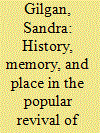| Srl | Item |
| 1 |
ID:
190184


|
|
|
|
|
| Summary/Abstract |
China’s contemporary classics-reading movement (dujing yundong) has grown significantly since its emergence in the 2000s but remains little researched and is so far only known as part of the revival of Confucianism on the popular level. This study, based on ethnographic field research in ten Chinese cities, discusses the movement’s character under the lens of the grounded utopian movement theory and combines this with the civil sphere theory to exhibit the movement’s potential for social change under China’s specific socio political conditions. While activists hope that reciting and memorising Confucian classics will cultivate virtuous individuals (junzi) who will change Chinese society from the bottom up, this study shows that involved parents, teachers, and headmasters have greater potential to bring about social change. The space to induce change, however, is fragile.
|
|
|
|
|
|
|
|
|
|
|
|
|
|
|
|
| 2 |
ID:
192982


|
|
|
|
|
| Summary/Abstract |
In the first decade of the twenty-first century, traditional Confucian education re-emerged in China in the context of so-called study halls and academies. The goal of the parents, teachers, and headmasters associated with them is to cultivate modern virtuous persons through an approach called “classics-reading education.” Even though they allude to deep historical roots, these contemporary facilities are novel (re)creations, developed in response to current needs. This article examines the classics-reading movement under the theoretical lens of infrastructures of memory to illustrate the roles of memory and the perception of the past in the current making of “traditional” education and educational sites. Memories of and references to the past inform people's visions of a better future that is to be achieved through their tradition-related educational practices. Making a connection with the past through memory aims at stability in the face of future uncertainty.
|
|
|
|
|
|
|
|
|
|
|
|
|
|
|
|